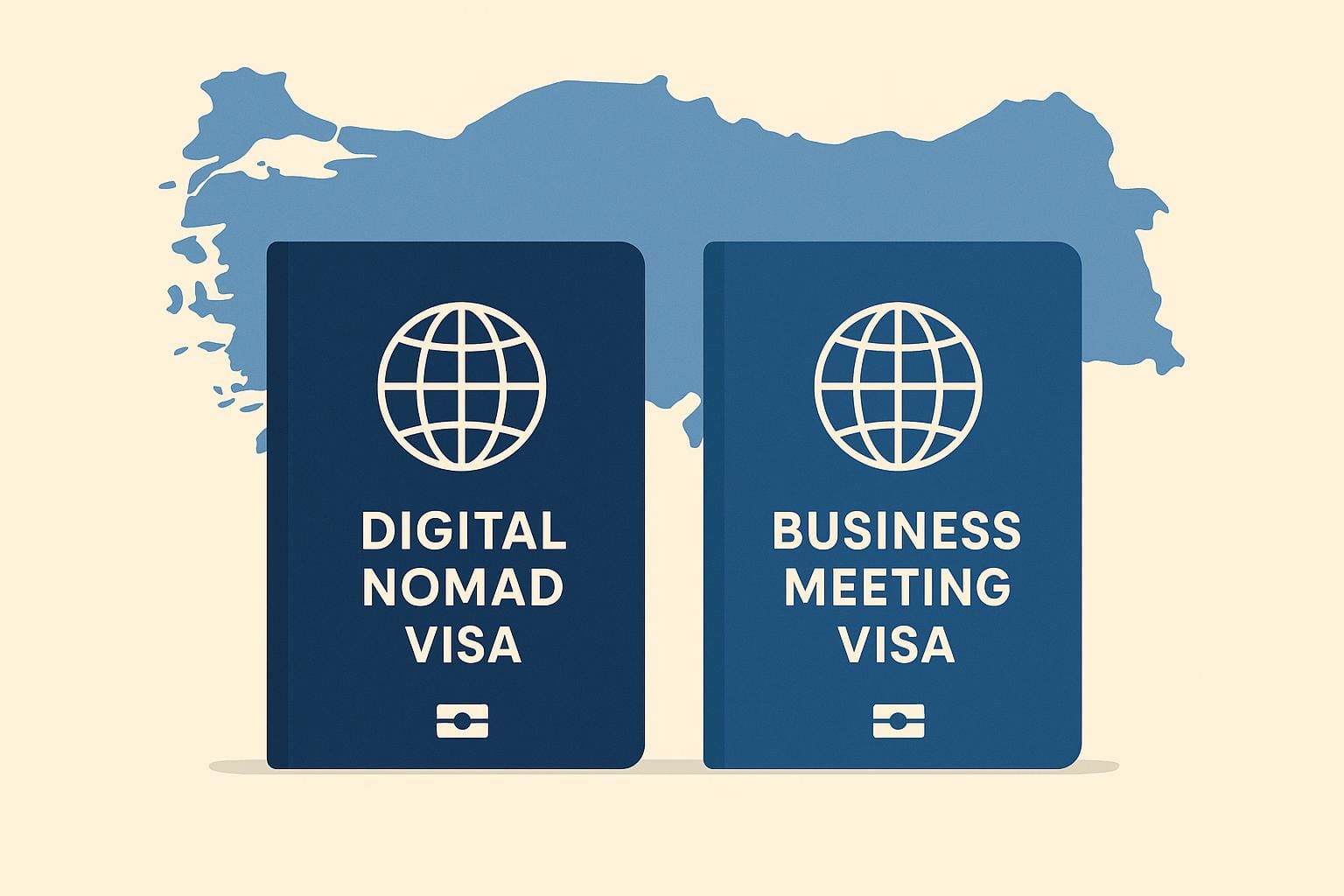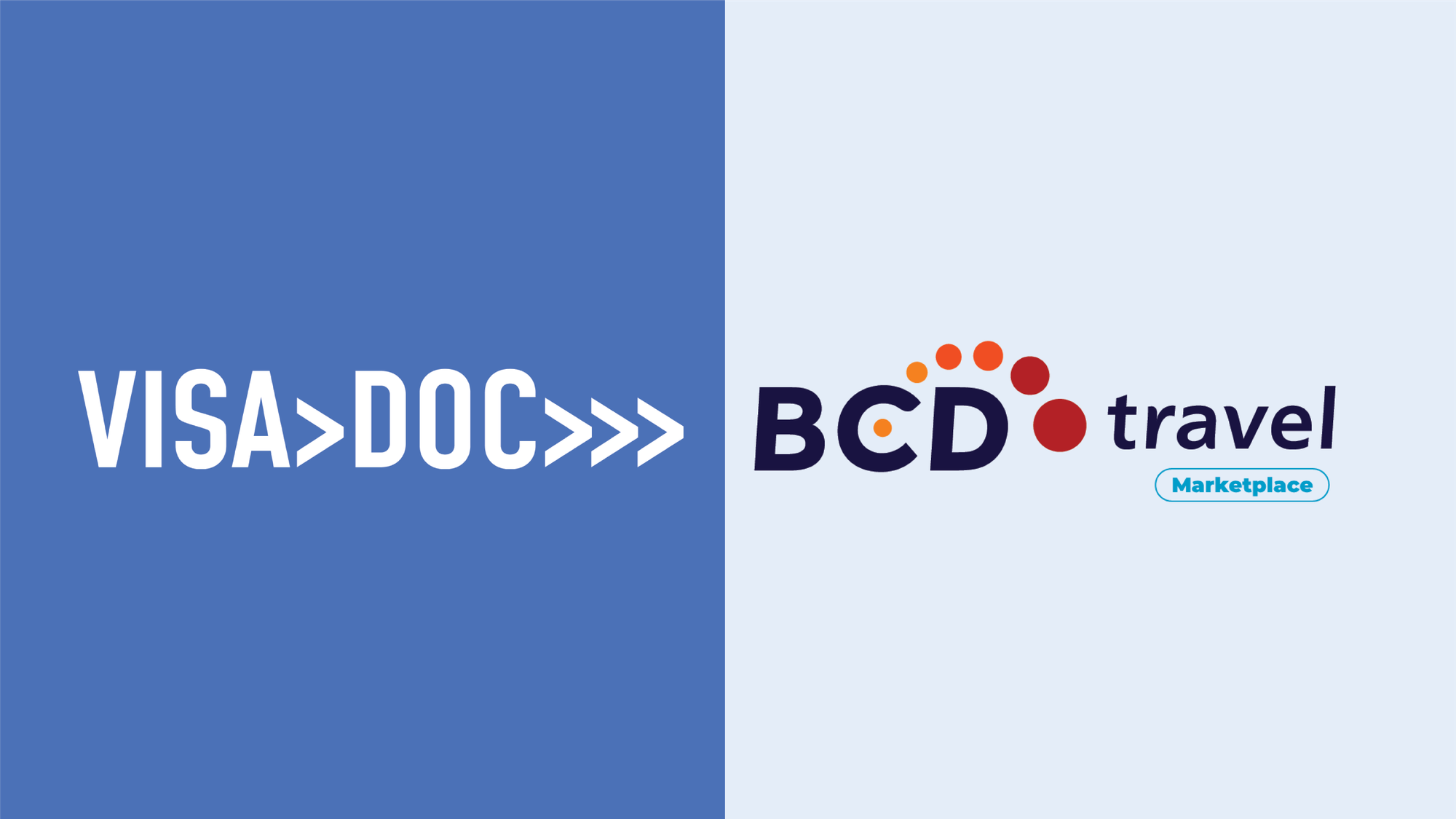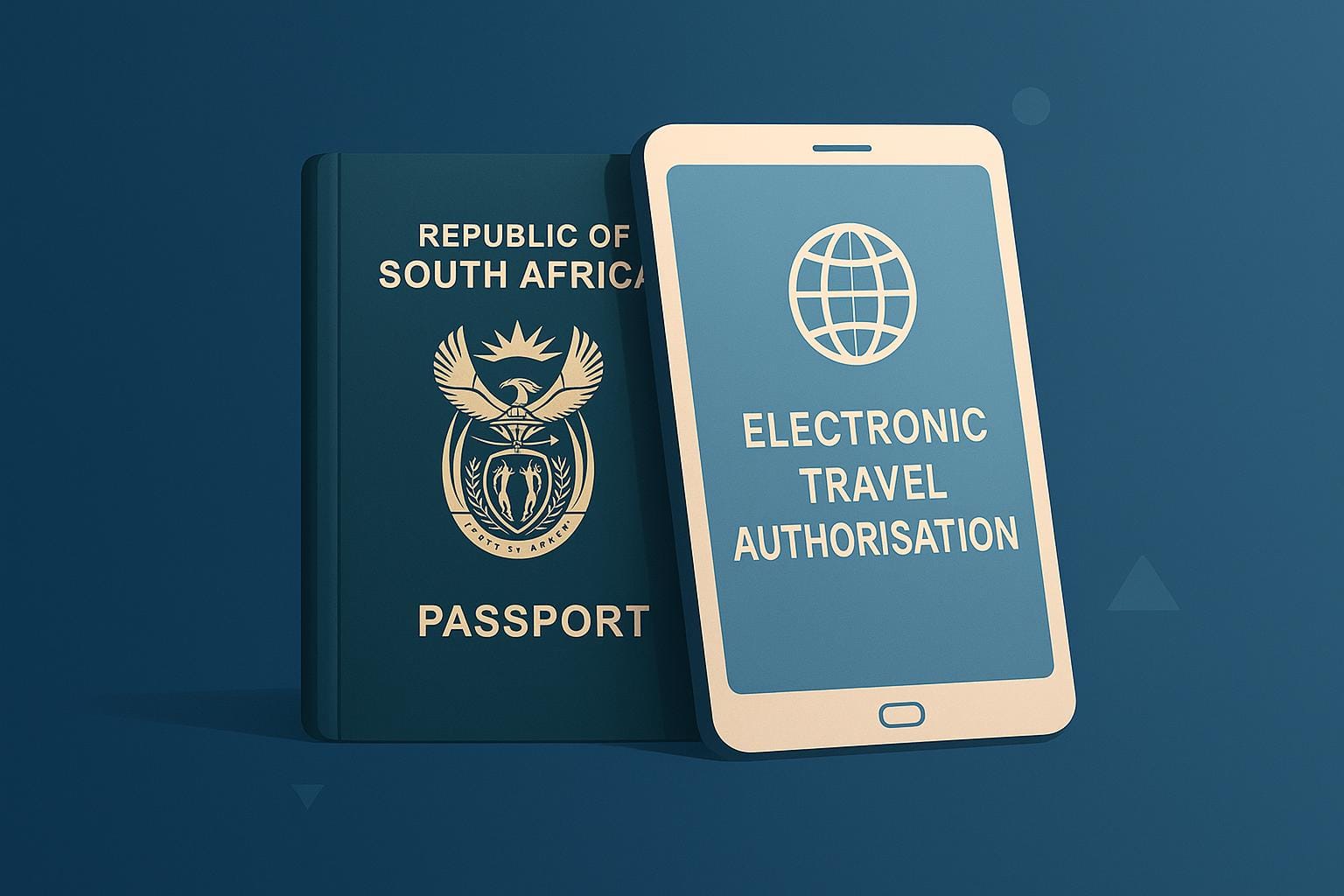Need to work remotely from Turkey or attend a business meeting? Choose the right visa.
Turkey offers two business visa types tailored for different needs:
- Digital Nomad Business Visa: For remote workers (21–55 years old) employed by non-Turkish companies. Stay up to 1 year (renewable twice). Requires proof of income (£2,400/month or £28,800/year) and a university degree. Strictly no local employment.
- Short-Term Business Meeting Visa: For professionals attending events like meetings or conferences. Valid for 90 days within 180 days. Requires an invitation from a Turkish company. No local employment allowed.
Quick Comparison
| Feature | Digital Nomad Business Visa | Short-Term Business Meeting Visa |
|---|---|---|
| Purpose | Remote work for non-Turkish companies | Business meetings, conferences, or events |
| Duration | Up to 12 months, renewable twice | 90 days within 180 days |
| Eligibility | Age 21–55, university degree, proof of income (£2,400/month) | Invitation letter from Turkish company |
| Employment in Turkey | Not allowed | Not allowed |
| Visa Fee | $190 (£152) | Varies by country |
Choose the right visa to ensure compliance with Turkish immigration laws and avoid penalties.
Digital Nomad Business Visa: Requirements and Process
What is the Digital Nomad Business Visa
Turkey's Digital Nomad Business Visa is designed for remote workers employed by foreign companies, providing them with a legal pathway to live in Turkey without needing local work permits.
This visa allows individuals to work remotely for their overseas employers or clients while enjoying Turkey's vibrant culture, pleasant weather, and relatively affordable cost of living. However, it strictly prohibits working for Turkish companies or engaging in local employment.
Who Can Apply
To be eligible, applicants need to meet several specific criteria:
Applicants must be between 21 and 55 years old, hold a university degree, and come from one of the eligible countries. They must also have valid health insurance, and in some cases, additional documentation may be required based on their professional background or circumstances.
| Requirement | Details |
|---|---|
| Eligible Nationalities | Austria, Belarus, Belgium, Bulgaria, Canada, Croatia, Czech Republic, Denmark, Estonia, Finland, France, Germany, Greece, Hungary, Iceland, Ireland, Italy, Latvia, Liechtenstein, Lithuania, Luxembourg, Malta, Netherlands, Norway, Poland, Portugal, Romania, Russia, Slovakia, Slovenia, Spain, Sweden, Switzerland, Ukraine, United Kingdom, USA |
| Age | Between 21 and 55 years old |
| Education | University degree required |
| Income | Minimum US$3,000 per month or US$36,000 per year (approximately £2,400 or £28,800) |
| Employment | Must be employed by a foreign company or self-employed with international clients |
| Passport Validity | At least six months from the date of arrival in Turkey |
How to Apply
The application process involves two main steps. First, applicants need to create an account on the Digital Nomads GoTürkiye website. Here, they must upload all required documents and obtain a Digital Nomad Identification Certificate.
Once they have the certificate, the next step is to visit a Turkish visa centre or consulate (or apply online for a residence permit if already in Turkey). It’s essential to ensure that all documents are up-to-date, legible, and, if necessary, accompanied by certified translations.
The visa fee for a multiple-entry permit is US$190 (approximately £152), payable during the visa centre appointment. Applicants should also review the visa's validity period and renewal options to plan their stay effectively.
Visa Length and Extensions
The visa is issued for one year and can be renewed twice, allowing a total stay of up to three years. To renew, applicants must continue meeting the income threshold, maintain valid health insurance, and remain employed by a foreign company or self-employed with international clients.
This structured timeline offers remote workers the stability they need to plan their stay while adhering to the visa regulations.
Short-Term Business Meeting Visa: Requirements and Process
What is the Short-Term Business Meeting Visa
Turkey's Short-Term Business Meeting Visa is intended for professionals attending business-related events such as meetings, conferences, or trade fairs in Turkey. Unlike the Digital Nomad Business Visa, this visa is specifically for temporary business activities and not for extended remote work. It provides a legal framework for international business professionals to visit Turkey for legitimate commercial purposes while clearly prohibiting employment within the country.
Who Can Apply
To qualify for the Short-Term Business Meeting Visa, applicants must demonstrate a genuine business purpose and provide the necessary documentation. Typically, this includes an invitation letter from a Turkish company that outlines the visit's purpose, duration, and planned business activities. Employers may also need to confirm the business nature of the trip. Additionally, valid travel documents are required. It’s worth noting that US citizens with regular passports don’t need a visa for tourism or short-term business visits of up to 90 days within a 180-day period. Once eligibility is confirmed, applicants can proceed with the application process.
How to Apply
To apply, complete the visa application form, gather the required documents as specified by the consulate's checklist, and submit the application to the Turkish embassy or consulate well in advance of your travel date to account for any potential processing delays. Be aware that applications may be rejected if documents or photographs fail to meet the required standards. It’s essential to consult the specific checklist provided by the Turkish consulate for your visa type and ensure all submitted information is accurate and matches the supporting documents to minimise the risk of rejection.
Visa Length and Restrictions
The Short-Term Business Meeting Visa is valid for 180 days (six months) from the date of issuance. Activities permitted under this visa include attending business meetings, negotiations, conventions, fairs, and congresses. Other allowed activities include participating in courses or training at the invitation of a Turkish company, conducting site visits for investment or purchase evaluations, and representing a company or foreign government in providing services or trading goods. However, the visa explicitly prohibits any form of employment in Turkey, ensuring it is strictly used for temporary business purposes.
Direct Comparison: Digital Nomad vs Business Meeting Visa
Now that we've broken down the details of each visa, let's take a closer look at how they stack up against each other. It's crucial for HR and global mobility teams to understand the differences to ensure compliance with Turkey's visa regulations. Each visa caters to distinct needs and comes with its own set of requirements, which can impact how organisations plan and manage international business travel.
Application Requirements Comparison
The Digital Nomad Business Visa is tailored for individuals working remotely for non-Turkish companies. To qualify, applicants need to provide proof of income and demonstrate they can financially sustain themselves while living in Turkey. Essentially, it's designed for those who are self-reliant and work independently from Turkish businesses.
On the other hand, the Short-Term Business Meeting Visa is meant for those visiting Turkey for business purposes, such as attending meetings or conferences. This visa requires a formal invitation from a Turkish company, detailing the purpose of the visit, its duration, and the activities planned during the stay.
Permitted Activities Comparison
The activities allowed under each visa highlight their different purposes. With the Digital Nomad Business Visa, individuals can live in Turkey and work remotely for up to a year. However, they are strictly prohibited from working for Turkish companies or earning income locally.
Meanwhile, the Short-Term Business Meeting Visa allows individuals to participate in meetings, explore business opportunities, or attend corporate events. However, this visa does not permit any form of employment or income generation within Turkey.
Duration and Renewal Comparison
The length of stay and renewal rules reflect the unique focus of each visa. The Digital Nomad Business Visa offers an initial stay of up to 12 months, with the possibility of renewal if the applicant continues to meet eligibility criteria. This longer duration is ideal for those with remote work arrangements requiring stability.
In contrast, the Short-Term Business Meeting Visa is valid for up to 90 days within a 180-day period. Renewal is generally not an option for this visa, and if a longer stay is necessary, applicants may need to apply for a residence permit.
| Feature | Digital Nomad Business Visa | Short-Term Business Meeting Visa |
|---|---|---|
| Duration | Up to 12 months, renewable | Up to 90 days within a 180-day period |
| Renewal | Possible if eligibility is maintained | Not extendable; residence permit may be needed |
| Restrictions | Local employment not allowed | Employment within Turkey not permitted |
This side-by-side comparison simplifies the process of selecting the right visa for business travel. For HR teams, it provides a clear framework to align visa choices with organisational needs. The Digital Nomad Business Visa is ideal for extended remote work arrangements, while the Short-Term Business Meeting Visa is better suited for traditional, time-limited business visits.
Real-World Applications and Compliance
Knowing which visa to use in different situations can be the difference between smooth operations and costly compliance headaches. HR teams must have clear strategies for matching visa types to business needs while staying fully aligned with Turkish immigration laws.
When to Use Each Visa Type
The Digital Nomad Business Visa is ideal for employees planning extended stays in Turkey while working remotely for a UK-based employer. Picture a software developer from London spending eight months in Istanbul to complete a project for their British company. Since they’re not employed by a Turkish organisation and need long-term accommodation, this visa provides the flexibility and duration required.
On the other hand, the Short-Term Business Meeting Visa is tailored for more traditional business trips. For instance, a sales team attending a three-day conference in Ankara or engaging in week-long negotiations with Turkish partners would find this visa suitable. The main difference lies in the nature of the work: remote workers employed by non-Turkish companies should opt for the Digital Nomad visa, while in-person business activities are better suited to the Business Meeting visa.
These examples illustrate how the choice of visa depends heavily on the type of work being done. For HR teams handling diverse employee needs, understanding these distinctions is critical. If an employee is conducting virtual meetings, managing projects, or handling admin tasks for a UK office while based in Turkey, the Digital Nomad visa is the right fit. Conversely, if they’re meeting clients, attending training, or working on business development, the Business Meeting visa is the way to go.
Legal Requirements and Risk Management
Beyond choosing the right visa, organisations must prioritise compliance to avoid significant risks. Adhering to Turkish immigration laws safeguards both employees and companies from fines, legal trouble, and reputational harm.
"Compliance with Turkish immigration rules is not just a legal necessity - it's a critical component of maintaining your company's reputation and ensuring uninterrupted business operations."
The consequences of using the wrong visa can be severe. Employees might face deportation or even blacklisting from future entry. For organisations, non-compliance could result in hefty penalties and operational disruptions.
HR teams have a legal obligation to confirm that all non-Turkish employees have the correct visa and work permits before starting employment. Tourist visas, for example, do not allow for legal work. It’s also important to monitor employees’ tax residency status, as staying in Turkey for more than 183 days in a calendar year may trigger tax residency.
Companies should also consider the risk of creating a permanent establishment (PE) in Turkey through remote employees. This could lead to corporate tax implications. Before initiating any immigration procedures, HR teams need to clarify project details, timelines, work locations, employee rotation plans, and the responsibilities of the Turkish hosting entity.
"We recommend always following the advice of an employment lawyer or EOR partner before making any decisions to hire employees in Turkey."
- People Managing People
How VisaDoc Simplifies Visa Management

To help mitigate these challenges, VisaDoc offers a streamlined solution for managing Turkish visa requirements. Relying on manual processes can increase compliance risks and operational burdens, but VisaDoc simplifies the entire workflow.
The platform provides detailed visa guides that clearly differentiate between Digital Nomad and Business Meeting visa requirements, enabling HR teams to make quick, informed decisions. With expert-curated, up-to-date content available in one place, staying compliant becomes much easier.
VisaDoc also uses AI-driven document verification to ensure that applications meet Turkish immigration standards before submission. This reduces the likelihood of rejections and delays. The system can automatically generate supporting documents and send personalised notifications when deadlines or requirements change.
For organisations juggling multiple visa applications, VisaDoc’s centralised dashboard tracks everything from application statuses to renewal dates and compliance requirements. Integration with HR and travel systems makes managing visas a seamless part of business operations.
The platform’s automated application fulfilment feature handles documentation while maintaining audit trails for compliance purposes. Additionally, companies can opt for VisaDoc's assisted support, which is especially helpful for navigating complex scenarios involving multiple visa types or extended business travel arrangements.
Conclusion
Choosing between the Digital Nomad Visa and the Short-Term Business Meeting Visa comes down to your specific work requirements. The Digital Nomad Visa is tailored for remote workers employed by foreign companies, offering stays of up to one year, provided income criteria are met. On the other hand, the Short-Term Business Meeting Visa is ideal for attending conferences, negotiations, or trade fairs, with stays limited to the duration of the event.
The key distinction lies in the nature of the work. Digital Nomad Visa holders work remotely for overseas employers without engaging with Turkish companies, while Business Meeting Visa holders participate in meetings or training without taking up local employment. The Digital Nomad Visa allows for extended stays, whereas the Business Meeting Visa is specific to short-term engagements.
For HR teams, aligning visa types with work requirements is essential to ensure compliance with Turkish regulations. Tools like VisaDoc simplify this process by offering automated document verification, compliance checks, and a centralised dashboard.
Choosing the right visa and leveraging efficient compliance tools ensures smooth and hassle-free operations.
FAQs
What are the main eligibility criteria for Turkey's Digital Nomad Business Visa?
To apply for Turkey's Digital Nomad Business Visa, you’ll need to meet a few important criteria:
- Be a citizen of an eligible country.
- Hold a valid passport with at least six months before it expires.
- Provide proof of health insurance that covers your stay in Turkey.
- Show a minimum monthly income of $1,500 (around £1,200).
- Submit evidence of remote work or self-employment, such as a work contract or business registration.
These requirements are in place to ensure applicants have the financial means and professional credentials to live and work remotely in Turkey.
What are the key differences in applying for Turkey's Short-Term Business Meeting Visa and the Digital Nomad Business Visa?
The Short-Term Business Meeting Visa generally requires you to visit a Turkish embassy or consulate in person. To apply, you'll need to submit several documents, including a valid passport, a completed visa application form, and an employer-issued letter. The processing time for this visa typically takes around 10 to 12 working days.
On the other hand, the Digital Nomad Business Visa is often handled online. Applicants can upload essential documents, such as identification and proof of income, digitally. This online process is usually quicker and eliminates the need for in-person visits, making it a practical choice for remote workers.
Which visa you choose depends on your travel plans. The Short-Term Business Meeting Visa is designed for attending specific business events or meetings, whereas the Digital Nomad Visa is tailored for remote professionals planning to work independently while based in Turkey.
What risks could arise if I apply for the wrong visa for business activities in Turkey?
Applying for the wrong visa for business activities in Turkey can cause serious problems. These might include visa rejection, entry bans, or even fines for breaking visa rules. Worse still, overstaying your visa or using the incorrect type may lead to legal trouble or affect your ability to visit Turkey in the future.
Mistakes like these can also raise red flags about your documentation or financial reliability, which could result in stricter scrutiny or complications with future applications. Such errors can disrupt your business plans, delay operations, and lead to expensive penalties. To steer clear of these issues, make sure to choose the right visa that matches your specific business needs.
Related Blog Posts
- India Business Travel Guide: Visas, Permits, and Cultural Tips for Success
- Business Visa Processing Times: Country-by-Country Guide
- UAE Business Meeting Visa Express: 14-Day Entry Options for Executive Delegations
- Contract Negotiation Trips to South Korea: Short-Term Business Visa Application Strategies













